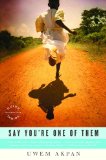Summary | Excerpt | Reading Guide | Reviews | Beyond the Book | Readalikes | Genres & Themes | Author Bio

"Maisha, our parents—"
She turned sharply, her fists balled.
"Shut up! You shame me, you rat. Leave me alone. Me am not your mate. You can't afford me!"
Other girls turned and stared at us, giggling. Maisha strode away. It had been a mistake to mention our parents in front of the other girls, to let them know that we were related. And I shouldn't have called her by her real name. I cried all the way home because I had hurt her. She ignored me for weeks.
After Mama stopped celebrating the end of our debt, she fished out two little waterproof Uchumi Supermarket bags from the carton and smoothed them out as if they were rumpled socks. She put them over her canvas shoes, tying the handles around her ankles in little bows. Then she walked out into the flood, her winged galoshes scooping the water like a duck's feet. She started to untie our bag of utensils and food, which was leaning against the shop, her eyes searching for a dry spot to set up the stove, to warm some food for the twins. But the rain was coming down too heavily now, and after a while she gave up.
"Jigana, so did you see those Maisha's ma-men?" she asked.
"There were three white men, plus driver. Tall, old men in knickers and tennis shoes. I shook hands with them. Beautifulbeautiful motorcar. . . . I even pinched that monkey."
"Motorcar? They had a motorcar? Imachine a motorcar to pick up my daughter." She stretched forward and held my arms, smiling. "You mean my daughter is big like that?"
Otieno woke up with a start. He stood groggily on the cushions, then he climbed over Mama's legs, levered himself over me with his hand on my head, and landed in the flood outside the shack in a crouch. He began to lower thin spools of shit into the water, whiffs of heat unwrapping into the night, the cheeks of his buttocks rouged by the cold.
When Otieno returned to the shack, he sat on Mama's legs and brought out her breast and sucked noisily. With one hand, he grabbed a toy Maisha had bought for him, rattling its maracas on Mama's bony face. She was still looking ragged and underweight, even though she'd stayed in the hospital to have her diet monitored after Baby graduated from the incubator.
Mama took out our family Bible, which we had inherited from Baba's father, to begin our Ex- mas worship. The front cover had peeled off, leaving a dirty page full of our relatives' names, dead and living. She read them out. Baba's late father had insisted that all the names of our family be included, in recognition of the instability of street life. She began with her father, who had been killed by cattle rustlers, before she ran away to Nairobi and started living with Baba. She called out Baba's mother, who came to Nairobi when her village was razed because some politicians wanted to redraw tribal boundaries. One day she disappeared forever into the city with her walking stick. Mama invoked the names of our cousins Jackie and Solo, who settled in another village and wrote to us through our church, asking our parents to send them school fees. I looked forward to telling them about the lit parks and the beautiful cars of Nairobi as soon as my teachers taught me how to write letters. She called out her brother, Uncle Peter, who had shown me how to shower in the city fountains without being whipped by the officials. He was shot by the police in a case of mistaken identity; the mortuary gave his corpse to a medical school because we could not pay the bill. She called Baba's second cousin Mercy, the only secondary school graduate among our folks. She had not written to us since she fell in love with a Honolulu tourist and eloped with him. Mama called Baba's sister, Auntie Mama, who, until she died two years ago of a heart attack, had told us stories and taught us songs about our ancestral lands every eve ning, in a sweet, nostalgic voice.
The sky rumbled.
"Bwana, I hope Naema put clothes on Baby before she left," Mama said to me, the middle of her sentence wobbling because Otieno had bitten her.
Copyright © 2008 by Uwem Akpan
Your guide toexceptional books
BookBrowse seeks out and recommends the best in contemporary fiction and nonfiction—books that not only engage and entertain but also deepen our understanding of ourselves and the world around us.